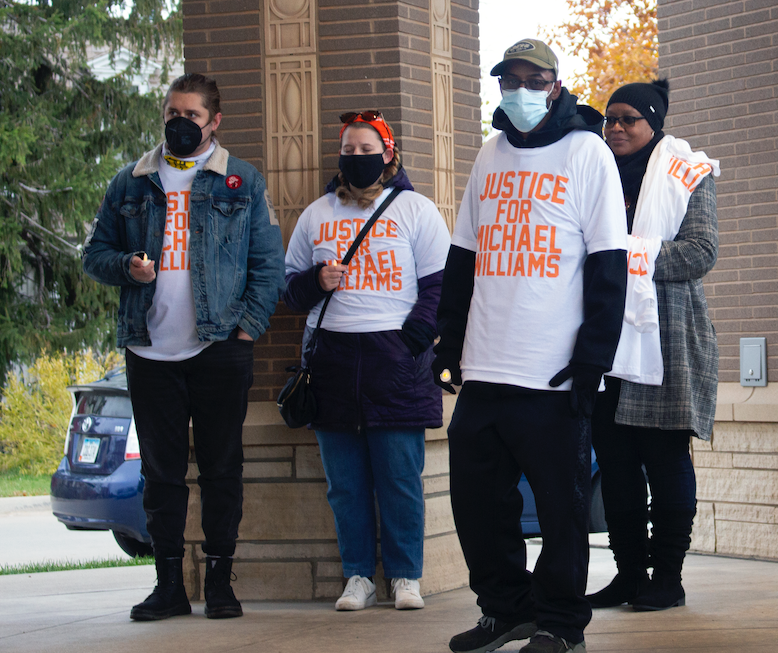A vigil for Michael Williams, a Grinnell man who was killed on Sept. 12, 2020, was held in Central Park on Saturday, Nov. 13. Friends and family of Williams wanted to honor his life in light of the trial of 32-year-old Steven Vogel, who is charged with Williams’ murder.
Williams, who was 44 at the time of his death, had lived in Grinnell since 2003. His murder as a Black man living in Grinnell (a city reported as 3.7 percent Black and 90.0 percent white in the 2020/21 census) came on the heels of worldwide protests against the death of George Floyd, a Black man murdered by a white police officer in Minneapolis, Minn., three months prior.
“No one is paying attention … there should be hundreds of people out here right now,” said a Grinnell man, who did not name himself when he spoke to the sparse crowd of 30 to 40 people. “When instances of racist violence happen in our community, we need to all stand up and shout about it.”
Williams’ remains were found set on fire in a ditch outside Kellogg, Iowa, on Sept. 16, 2020. The coroner’s reports indicated that had been strangled four days earlier.
Vogel is charged with first-degree murder and abuse of a corpse. Grinnell residents Julia Cox, 55, Roy Garner, 57, and Cody Johnson, 29, are charged with abuse of a corpse and being an accessory to murder. Cox and Garner are also charged with destruction of evidence. Each accused individual will be tried separately, and Vogel’s is the first trial to begin.
The Iowa Department of Criminal Investigations (DCI) previously stated that they do not believe race was a motivating factor in the crime, though multiple people who spoke at the gathering on Saturday vocally disagreed.
DCI officers and officers from the Jasper and Poweshiek County Police Departments met with Betty Andrews, president of the Iowa-Nebraska National Association for the Advancement of Colored People (NAACP), and Kevin Sanders and Arnold Woods Jr., presidents of the Iowa City and Des Moines chapters of the NAACP, respectively, after Williams’ body was identified. At a press conference on Sept. 22, Andrews said that the NAACP does not believe that Williams was targeted because of his race, but that she is open to revising that statement in light of new evidence.
Williams’ family and the Iowa Coalition for Collective Change (ICCC), who organized the vigil, encouraged attendees to wear orange, Williams’ favorite color. Vigil attendees were also provided with “Justice for Michael Williams” shirts and tea light candles.
“There are no explanations for when horrible things like this happen, but I think something beautiful is spurred when we can come together like this and we can show up for Michael and his family,” said the first speaker at the vigil, who did not name herself.
“I have one request for those of you today who did not know him: that you keep showing up for his family, and you continue to keep telling Michael’s story, and you keep explaining to your family members and your friends and all Iowans what happened and that you do the work to ensure nothing like this happens again,” she said, before asking for a moment of silence.
And when the moment of silence passed, she looked to the crowd, then down to her phone, and began to read out “A Small Needful Fact” by Ross Gay, a poem written in response to the death of Eric Garner, a Black man killed by a New York City police officer in 2014.
The trial began Friday, Nov. 12, and continues at the Keokuk County courthouse in Sigourney, IA. Every speaker at the vigil encouraged others to come to the trial to support the family.
“If you can show up Monday, come to court. Come to court. Period,” said Monique Washington, who identified herself as an advocate for Williams’ family.
Read more about Michael Williams’ life here.




























































